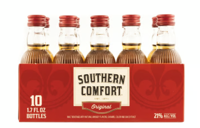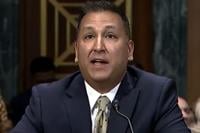
BROOKLYN, N.Y. - A federal judge is letting a lawsuit over little, weaker Southern Comforts move forward as a class action, driving up the possibility the drink's maker will need to spend millions of dollars settling the case.
New York federal judge Arun Subramanian on July 1 certified a class of New Yorkers who purchased the small, malt beverage version of Southern Comfort. The lawsuit alleged the product's labeling led consumers to think they were actually getting the whiskey-based liqueur, just in a smaller bottle.
Subramanian earlier this year rejected Sazerac's motion to dismiss the case, which was brought by an attorney who has been called a "wrecking ball" by one judge for filing hundreds of class actions based on dubious theories of consumer confusion.
But that lawyer, Spencer Sheehan, looks to be in command of the Southern Comfort case, though there are still issues to sort out - like whether a study that found 63% of consumers thought they were getting the liqueur was "fatally flawed."
"(W)hether plaintiffs can succeed on their claim that the product's packaging is materially misleading goes to the merits, not to class certification," Subramanian wrote.
Plaintiff Steven Khan was found to be an adequate class representative, though co-plaintiff Wilbert Andrews was not. He testified that he signed a document provided to him by lawyers stating he paid $1.50 for each bottle he purchased, which wasn't true.
Asked why he would sign something without reading it, he replied, "The, umm - the email said that it was the document that I had had to sign, so I had - I had signed it right - right away."
Southern Comfort sells the low-strength beverage in convenience stores that aren’t licensed to sell liquor. Plaintiff expert William Robert Ingersoll says consumers would have paid 8.8% less for the bottles had they known the difference.
Sazerac sought to dismiss the case, saying the label contained federally mandated language, but Judge Subramanian rejected that argument. New York’s General Business Law prohibits “materially misleading” practices, and “the `materially misleading’ prong does the trick,” the judge wrote.
That test is “ideal for class certification” because it allows the court to assume every purchaser relied upon the seller’s representations, he said.
Charles Moore of Reese LLP and Neal Jamison Deckant of Bursor & Fisher are also class counsel, along with Sheehan.
Sheehan has angered defendants and judges with his novel theories of consumer deception. A Florida judge ordered him to pay $140,000 to Big Lots for pursuing a theory that had already lost in New York, while Ricola sought a $60,000 penalty after winning dismissal of a case over herbal menthol in cough drops.
Sheehan first gained notoriety as the "vanilla vigilante," filing a host of lawsuits that claimed vanilla flavoring in products did not contain traditional vanilla.
Sheehan has sued because the strawberry flavoring in Pop-Tarts comes from pears and apples and is dyed red. He complained Bagel Bites have cheese that is a blend made with skim milk and feature tomato sauce that contains ingredients consumers wouldn't expect (the judge hearing that case called his claims "unreasonable and unactionable").
He lost a lawsuit that said the fudge in fudge-covered Oreos should adhere to traditional definitions of "fudge" by containing more milk fat and not palm oil and nonfat milk.
A ruling in New York ordered Sheehan to pay a defendant's excess costs and fees and hit him with a $1,000 fine. He had sued the Dutch airline KLM, alleging it induced consumers to fly on it by misrepresenting its commitment to climate goals.
During litigation, it came to light his plaintiff had used a third party to book tickets and had not specifically picked KLM. Judge Ronnie Abrams said she hopes "Sheehan has learned a valuable lesson."
Elsewhere, in his home state of New York, Sheehan waited more than a year to find out his punishment in a case against Starbucks. He sued the company in 2022, with his plaintiff Kristie Brownell alleging the company charged price for its French Roast Ground 100% Arabica coffee that was higher than similar products.
Calling it "100% Arabica" led customers to believe there were no additives, the suit says, despite the presence of added potassium. Judge Frederick Scullin found there was no added potassium, then in November 2023 found Sheehan in civil contempt for filing a frivolous lawsuit.
After 13 months, he was fined only $500, which he appealed.








